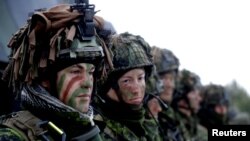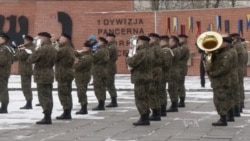The United States has signed defense cooperation agreements with Lithuania and Estonia, formalizing the deployment of thousands of troops to bolster NATO defenses in the face of a Russian threat of aggression.
The agreements, signed Tuesday, will regulate the legal status of U.S. armed forces in the two Baltic states and are part of the biggest NATO reinforcement since the end of the Cold War. Four multinational battalions are being deployed in Estonia, Latvia, Lithuania and Poland.
Far greater numbers of Russian troops are stationed just across the border, but the multinational makeup of NATO's deployment is designed as a so-called tripwire defense, said Jonathan Eyal of Britain's Royal United Services Institute.
"All of them could suffer exactly the same fate if there is an invasion of these countries," he said. "And therefore any invasion of these countries will automatically trigger off a response by all the NATO countries."
The United States is sending close to 6,000 troops, alongside tanks, heavy weapons and aircraft. It will lead the NATO battalion deployed in Poland.
In a newspaper interview this week, U.S. President-elect Donald Trump called NATO "obsolete," rattling European allies. Eyal said front-line states fear the U.S. deployment could be scaled back.
Watch: US Signs Defense Agreements With Baltic States
'Divided' alliance
"NATO at the moment is a divided organization," he said. "There are certain countries where there are American troops. There are others where there are none. The deployment was meant to equalize the security umbrella of the alliance. If there is anyone in Washington who draws back from that position, that would have serious consequences for the alliance."
Russia has deployed nuclear-capable Iskander missiles alongside thousands of troops to its exclave of Kaliningrad, which borders Poland and Lithuania. This week, Lithuania announced plans for a border fence along the frontier. It is not designed to prevent a military incursion, but to deter other illegal activity, said Linas Kojala of the Eastern Europe Studies Center in Vilnius, who spoke to VOA via Skype.
"The first aim is to ensure that the border is being surveilled all the time and that there are officers who are able to see what is going on in different stretches of the border," Kojala said. "And, of course, the scenarios that can occur there are both smuggling and some kind of hybrid activities that we've seen coming from Russia in our neighboring countries such as Ukraine or even Estonia."
Estonia alleges Russia abducted one of its border guards on Estonian territory in 2014 in a cross-border raid. Moscow said the guard was on the Russian side of the frontier. NATO members fear Russia could attempt similar so-called hybrid tactics, such as the kind Moscow used in its forceful takeover of Crimea in 2014, following the new Baltic deployments.















